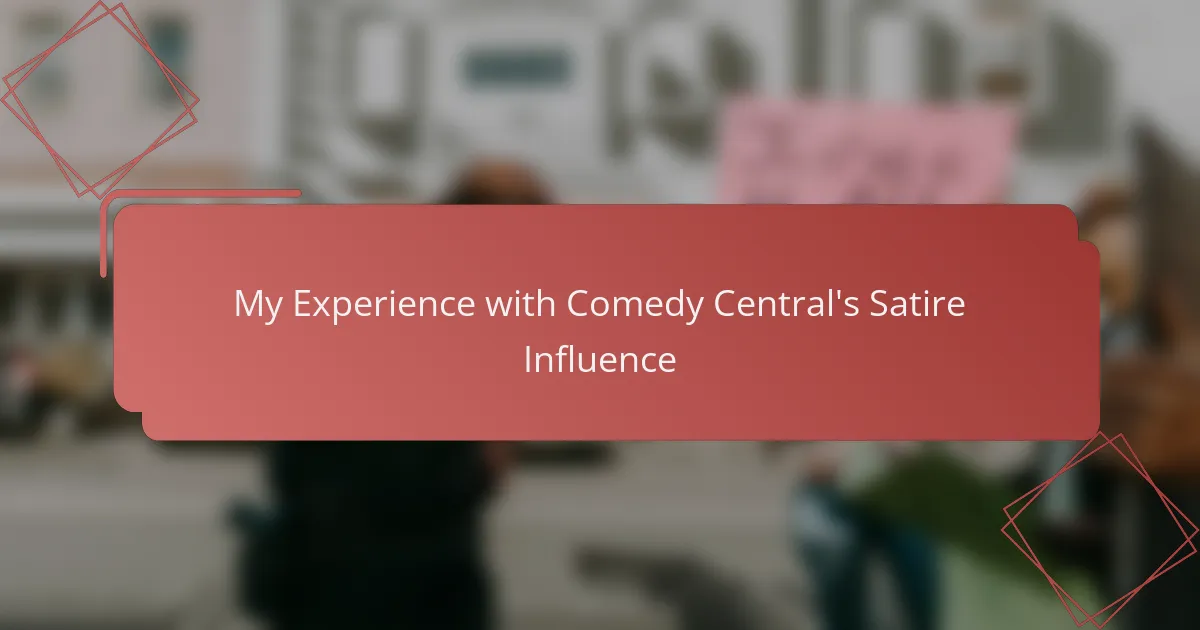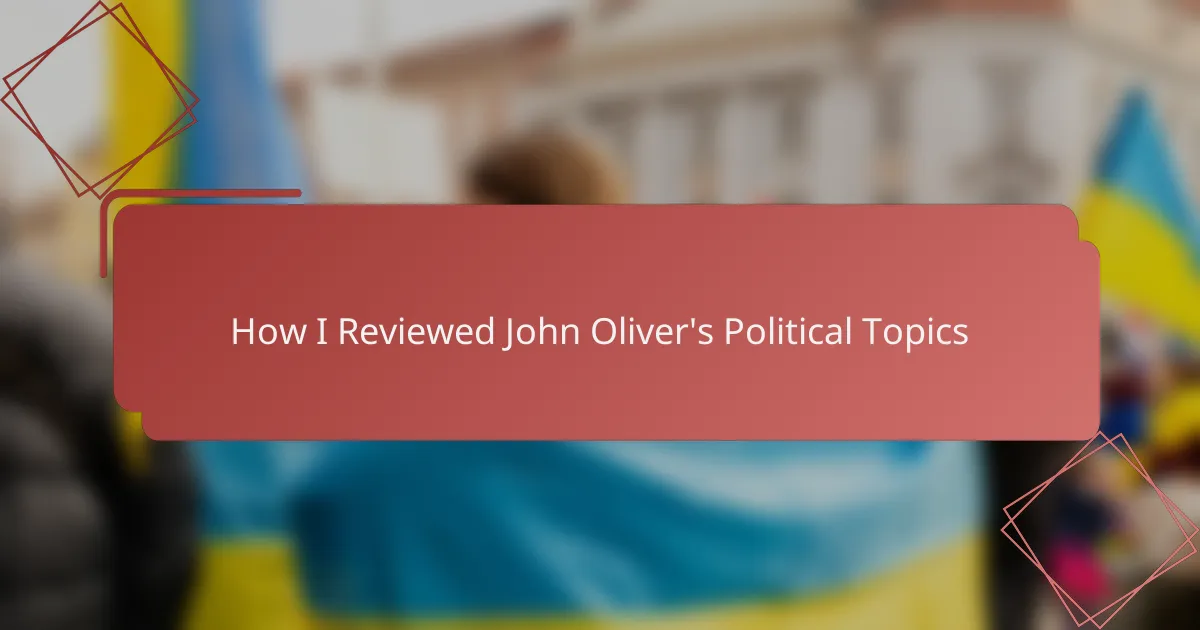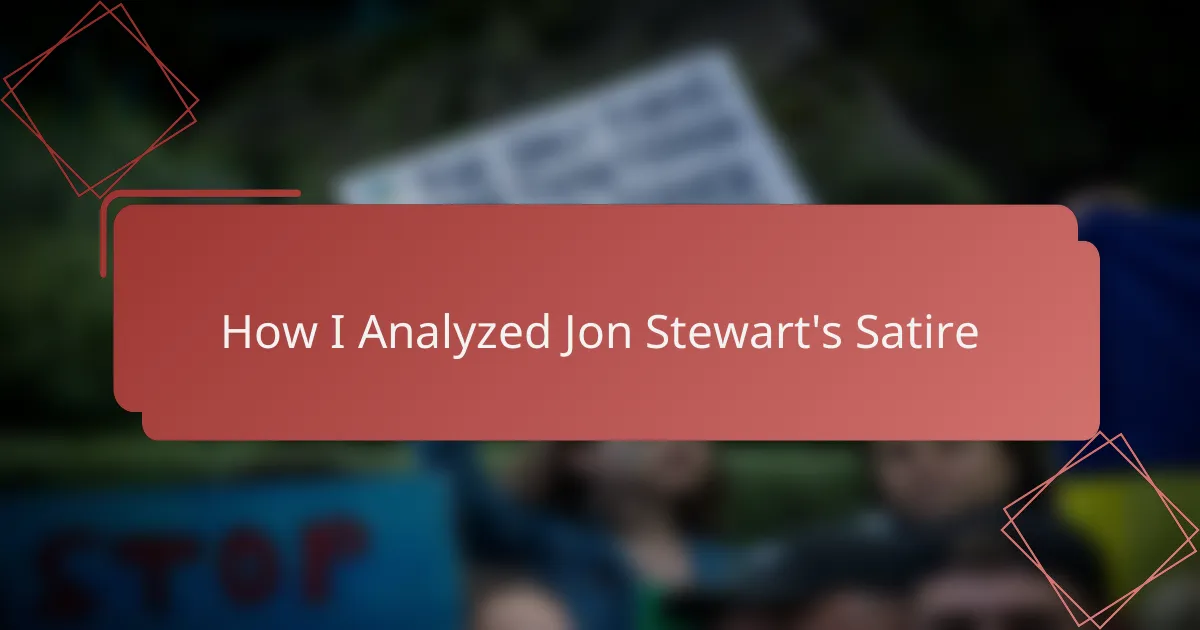Key takeaways
- Political satire effectively uses humor to reveal the absurdities of politics, promoting critical thinking and relatability.
- Comedy Central’s shows balance entertainment and informative commentary, making complex political issues accessible and engaging.
- Techniques like irony, parody, and exaggeration enhance the impact of satire, encouraging viewers to reflect on societal norms and political realities.
- Applying satire in conversations fosters deeper engagement and makes discussions about politics more enjoyable and thought-provoking.
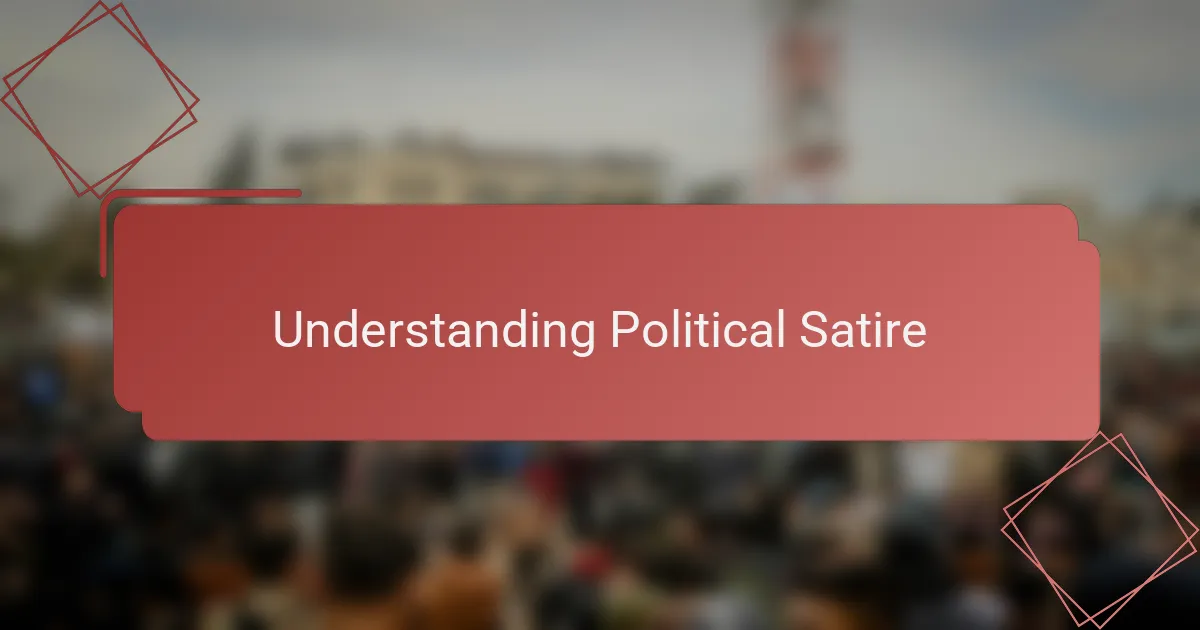
Understanding Political Satire
Political satire has a unique way of peeling back the layers of political life, exposing absurdities through humor. From my own experience, watching Comedy Central’s satirical shows made me realize how humor can deepen understanding by presenting complex issues in a relatable manner. It’s not just about laughs; it’s about seeing politics from a critical, yet accessible viewpoint.
What I find fascinating is how satire can provoke thought without feeling heavy or preachy. For example, certain sketches reminded me of moments when I felt frustrated with political rhetoric, but a punchline helped me see the bigger picture with a bit more clarity and even hope.
Here are some key elements that define political satire:
– Uses humor to highlight political flaws and contradictions
– Encourages critical thinking by exposing hypocrisy
– Balances entertainment with informative commentary
– Creates a connection through relatable scenarios and characters
– Often employs exaggeration and irony to emphasize points
– Acts as a mirror reflecting societal and political realities
This breakdown shows why satire resonates so well with audiences, including myself—it’s clever, insightful, and deeply human.
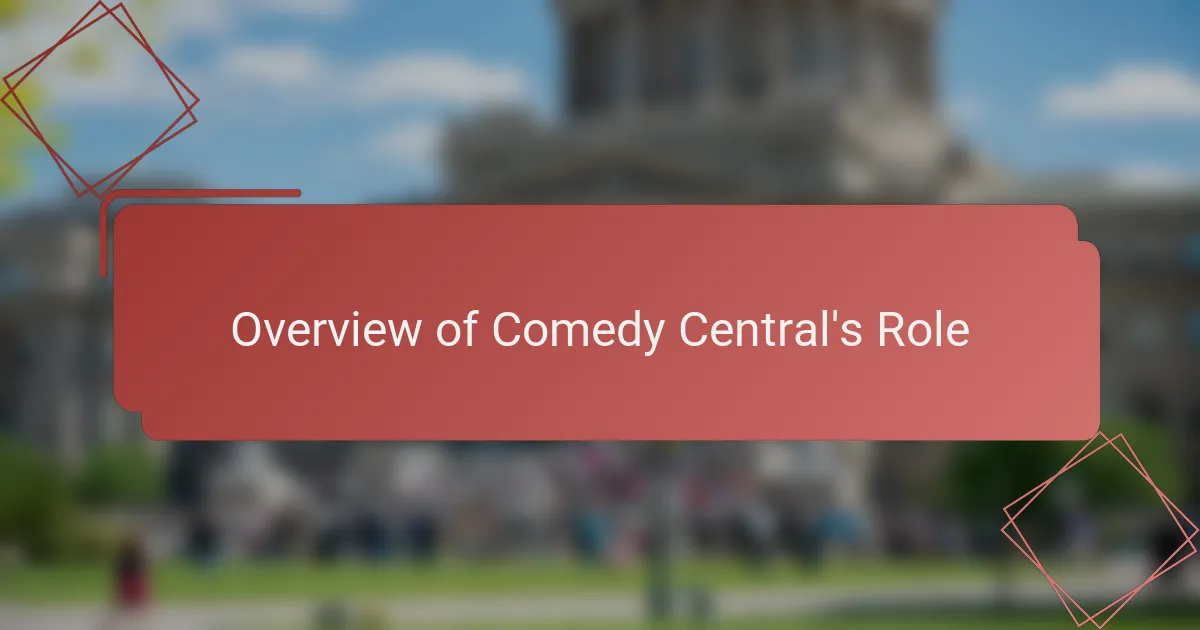
Overview of Comedy Central’s Role
Comedy Central has played a huge part in shaping how I see political satire today. Their shows aren’t just funny; they craft stories that stick with you, making complex politics feel like conversations you want to join. Have you ever caught yourself laughing at a joke, only to realize it’s shedding light on something pretty serious? That’s exactly the kind of experience Comedy Central excels at delivering.
What really stands out for me is how they balance sharp critique with humor. It’s a difficult tightrope to walk—be witty without losing the message—but Comedy Central manages this by creating characters and scenarios that feel both exaggerated and real. I remember binge-watching a series where each episode peeled back political absurdities, and I was amazed at how much I actually learned while I was laughing.
Doesn’t it make you wonder how a comedy channel ended up influencing political conversations so much? Comedy Central’s role goes beyond entertainment; it encourages viewers like me to rethink ideas and challenge the status quo, all while keeping the mood light enough to invite reflection rather than resistance. This blend of humor and insight is what makes their influence so powerful in political satire.
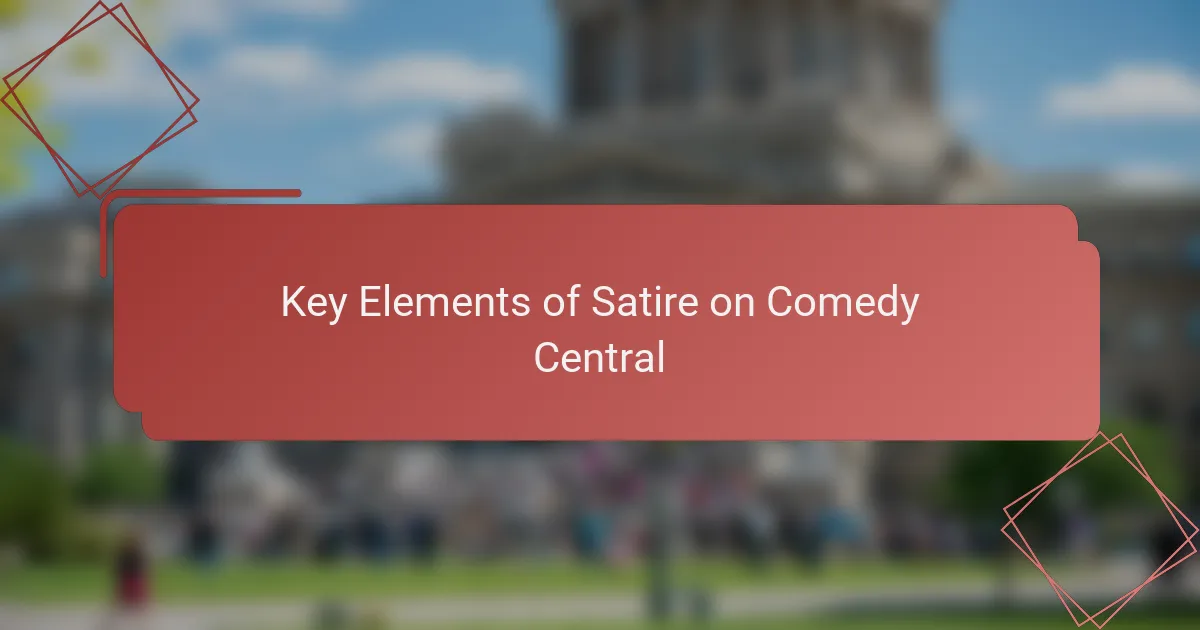
Key Elements of Satire on Comedy Central
Comedy Central’s satire strikes a fine balance between humor and sharp political critique. From my experience, their ability to weave absurdity with real-world events makes even the most complex issues feel accessible and engaging. The exaggerated portrayals often hit harder precisely because they mask serious truths in laughter.
I remember watching one segment where the show’s over-the-top mockery made me pause and rethink my usual political stance. It’s this blend of wit and insight that turns passive viewers into critical thinkers. The use of irony and parody not only entertains but provokes genuine reflection on societal norms.
| Element | Comedy Central Example |
|---|---|
| Irony | Daily Show’s reporting tone that mimics traditional news but with sarcastic commentary |
| Parody | South Park’s exaggeration of political figures and events for comedic effect |
| Exaggeration | Colbert Report’s amplified persona of a conservative pundit to highlight political absurdities |
| Social Critique | Key & Peele sketches addressing racial stereotypes and cultural issues |
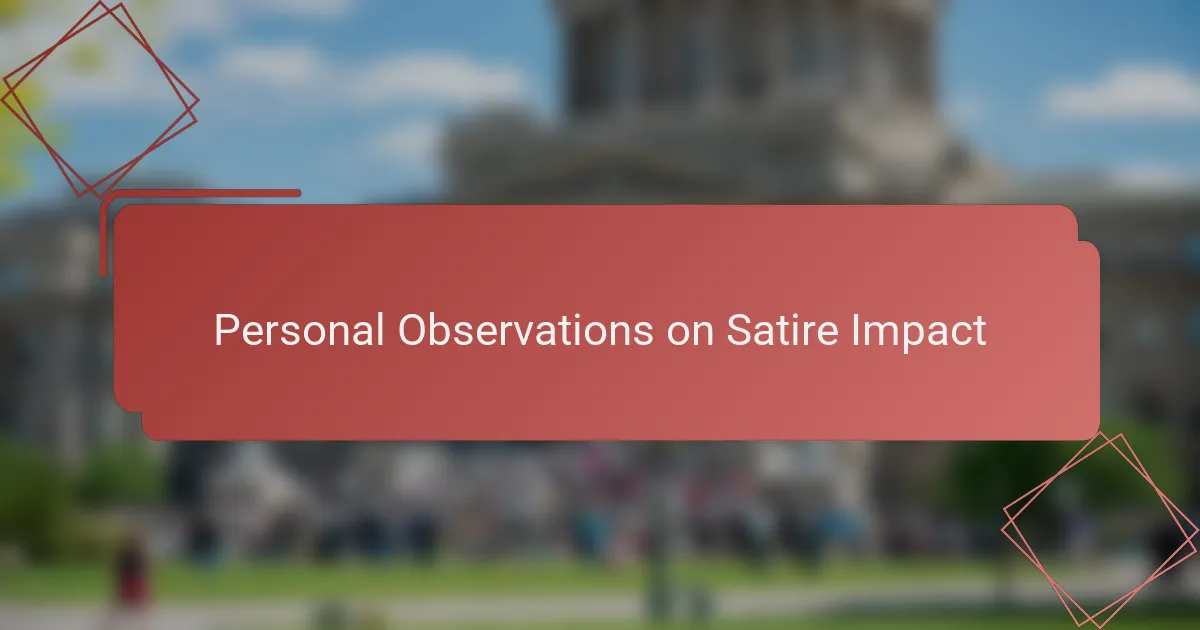
Personal Observations on Satire Impact
| Before Watching Comedy Central Satire | After Watching Comedy Central Satire |
|---|---|
| Political issues felt distant and confusing. | Started understanding politics through humor and relatability. |
| Discussions about politics were dull and often frustrating. | Found myself eagerly joining conversations, using satire-inspired jokes to lighten debates. |
| Sometimes felt overwhelmed by negativity in news. | Satire provided a healthy outlet to process and reflect critically without feeling hopeless. |
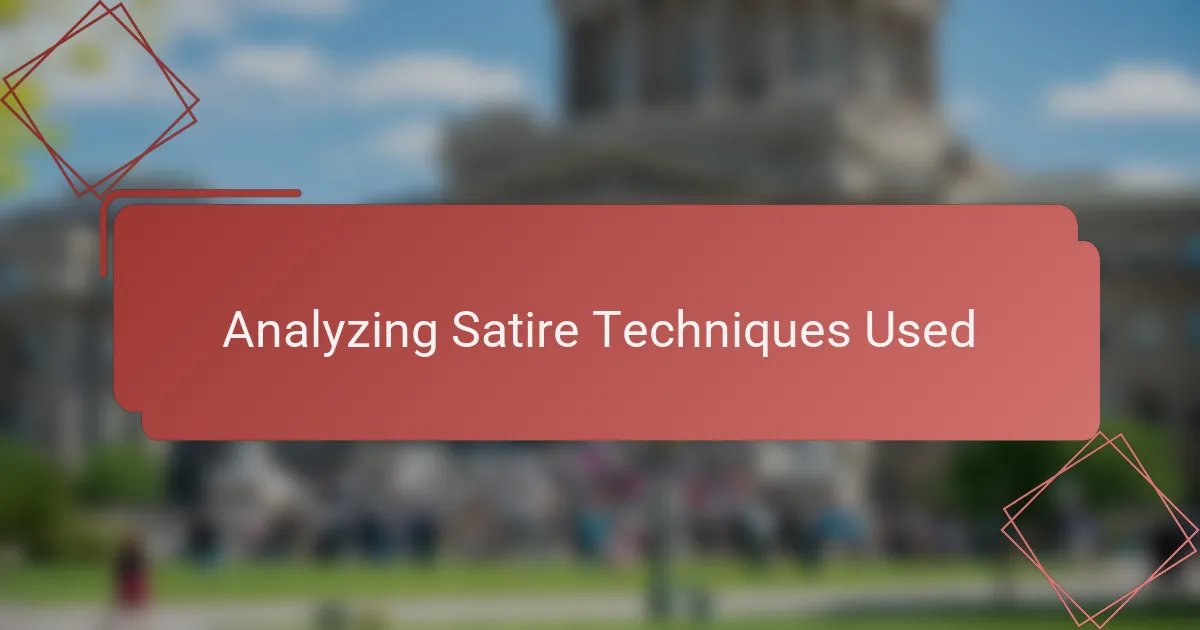
Analyzing Satire Techniques Used
One technique that really caught my attention is irony—Comedy Central often mirrors traditional news formats but injects a sarcastic twist that makes you think twice. I remember feeling a mix of amusement and surprise when a seemingly straightforward report suddenly unveiled a sharp critique hidden beneath the humor. Doesn’t that approach make the message stick better than a dry news story ever could?
Parody also plays a huge role. Shows like South Park take political figures and events to the extreme, turning them into caricatures that are undeniably funny yet painfully accurate. It’s this exaggerated lens that made me realize how satire can peel back the surface and reveal uncomfortable truths in a way that feels both accessible and entertaining.
Then there’s social critique interwoven with humor, which works on a deeper level. Watching sketches that tackle sensitive cultural issues, I often felt challenged but never dismissed, as if the satire was inviting me to reflect rather than just laugh. Have you ever found yourself laughing first, then quietly questioning your own assumptions? That’s exactly the power of these techniques combined.
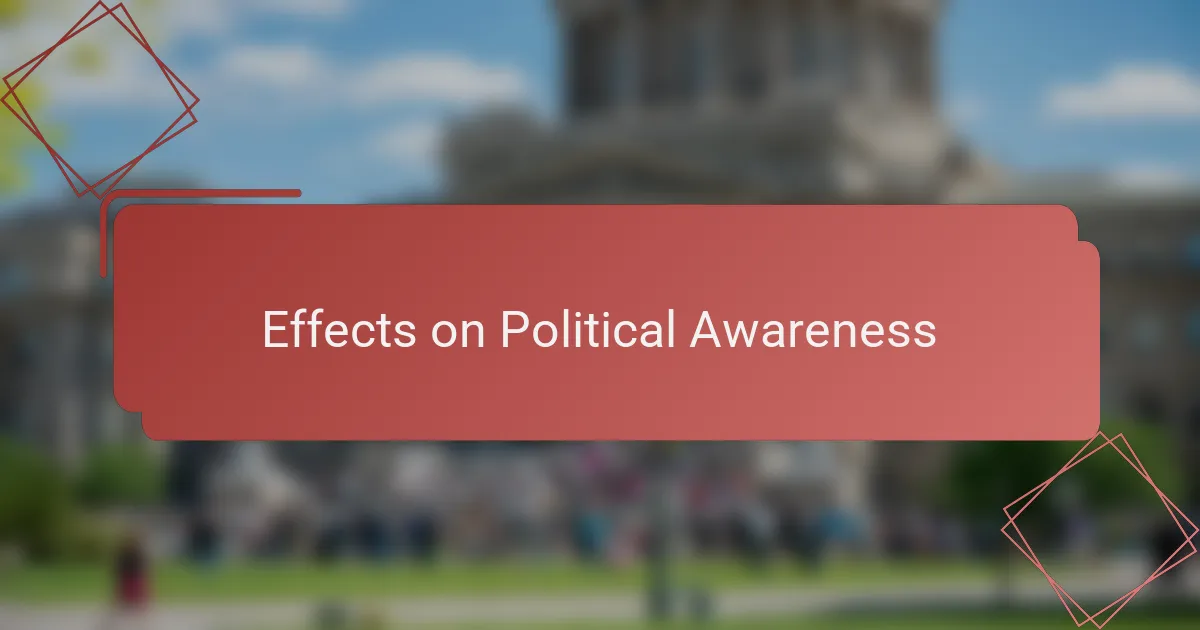
Effects on Political Awareness
What truly struck me about Comedy Central’s satire is how it sharpened my political awareness without feeling like a lecture. After tuning in regularly, I noticed I was catching nuances in political debates that once flew right over my head. Have you ever experienced that moment when a joke suddenly clicks, and you realize there’s a deeper truth behind it? That’s the kind of awakening satire triggered for me.
At times, the humor made complex policies more approachable. Instead of feeling lost or overwhelmed by the endless news cycle, satire offered me a new lens—one that mixed wit with insight. This approach didn’t just reveal political absurdities; it invited me to question prevailing narratives and think critically about who benefits from certain political rhetoric.
I also found that satire boosted my engagement in political discussions. By referencing a clever skit or punchline, I could break tension and encourage others to look at issues from fresh perspectives. Isn’t it fascinating how laughter can open doors to serious conversations? Comedy Central’s satirical style showed me that political awareness doesn’t have to be dry or divisive; it can be sharp, entertaining, and deeply thought-provoking all at once.
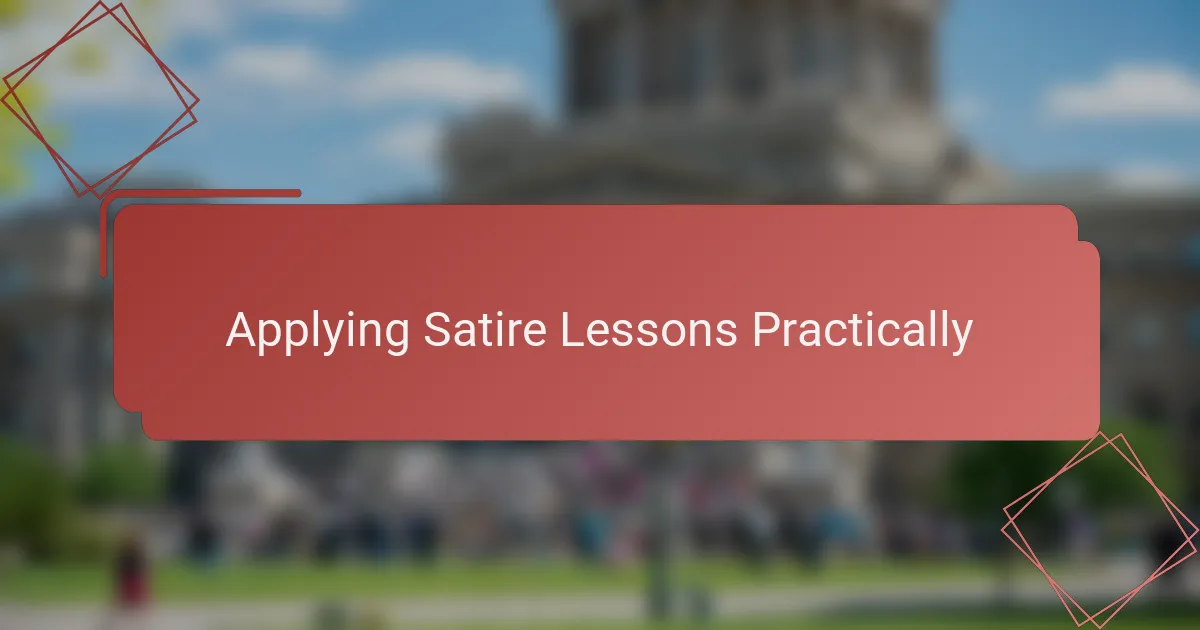
Applying Satire Lessons Practically
When I first started applying the satire techniques I learned from Comedy Central’s shows, I noticed a shift in how I approached everyday conversations about politics. Instead of just stating opinions, I began using humor and irony to highlight absurdities, making discussions not only easier but genuinely more engaging. This approach often eased tension and sparked thoughtful reflection among friends and colleagues, which felt incredibly rewarding.
One practical lesson I found particularly powerful was mastering the art of exaggeration to spotlight real issues without sounding preachy or bitter. It transformed my writing and speaking style, enabling me to communicate critiques with a light touch that still packed a punch.
Here are some practical ways I applied these satire lessons:
- Use irony to reveal contradictions in political statements or actions.
- Employ exaggeration carefully to emphasize flaws without alienating the audience.
- Incorporate relatable, everyday examples to connect broader issues to personal experiences.
- Balance humor with respect to keep conversations constructive rather than confrontational.
- Experiment with different tones—sarcasm, deadpan, playful—to see what resonates best in various contexts.
